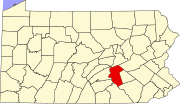Piketown, Pennsyvainia | |
|---|---|
| Coordinates: 40°22′44″N76°45′22″W / 40.37889°N 76.75611°W | |
| Country | United States |
| State | Pennsylvania |
| County | Dauphin |
| Township | West Hanover |
| Population (2010) | |
• Total | 824 |
| Time zone | UTC-5 (Eastern (EST)) |
| • Summer (DST) | UTC-4 (EDT) |
Piketown is an area in West Hanover Township, Dauphin County, Pennsylvania, United States, located near Fort Indiantown Gap. [1]


